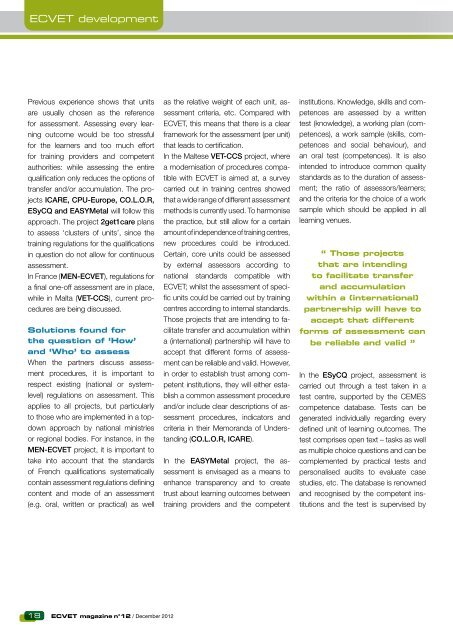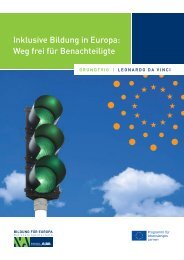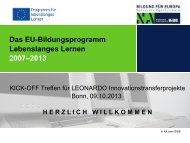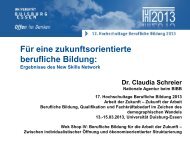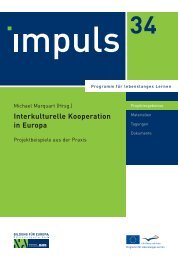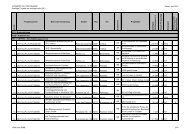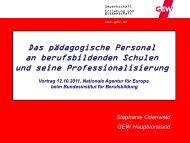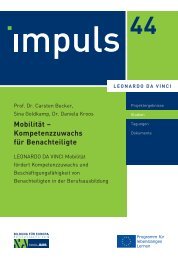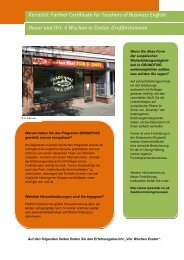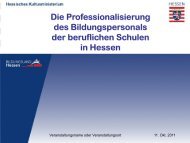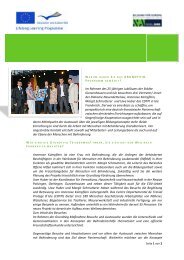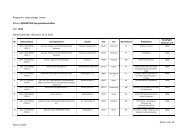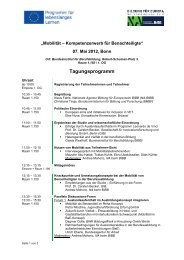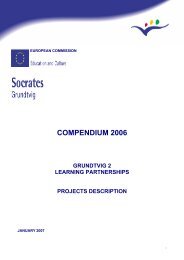Create successful ePaper yourself
Turn your PDF publications into a flip-book with our unique Google optimized e-Paper software.
ECVET development<br />
Previous experience shows that units<br />
are usually chosen as the reference<br />
for assessment. Assessing every learning<br />
outcome would be too stressful<br />
for the learners and too much effort<br />
for training providers and competent<br />
authorities: while assessing the entire<br />
qualification only reduces the options of<br />
transfer and/or accumulation. The projects<br />
ICARE, CPU-Europe, CO.L.O.R,<br />
ESyCQ and EASYMetal will follow this<br />
approach. The project 2get1care plans<br />
to assess ‘clusters of units’, since the<br />
training regulations for the qualifications<br />
in question do not allow for continuous<br />
assessment.<br />
In France (MEN-ECVET), regulations for<br />
a final one-off assessment are in place,<br />
while in Malta (VET-CCS), current procedures<br />
are being discussed.<br />
Solutions found for<br />
the question of ‘How’<br />
and ‘Who’ to assess<br />
When the partners discuss assessment<br />
procedures, it is important to<br />
respect existing (national or systemlevel)<br />
regulations on assessment. This<br />
applies to all projects, but particularly<br />
to those who are implemented in a topdown<br />
approach by national ministries<br />
or regional bodies. For instance, in the<br />
MEN-ECVET project, it is important to<br />
take into account that the standards<br />
of French qualifications systematically<br />
contain assessment regulations defining<br />
content and mode of an assessment<br />
(e.g. oral, written or practical) as well<br />
18 ECVET magazine n°12 / December 2012<br />
as the relative weight of each unit, assessment<br />
criteria, etc. Compared with<br />
ECVET, this means that there is a clear<br />
framework for the assessment (per unit)<br />
that leads to certification.<br />
In the Maltese VET-CCS project, where<br />
a modernisation of procedures compatible<br />
with ECVET is aimed at, a survey<br />
carried out in training centres showed<br />
that a wide range of different assessment<br />
methods is currently used. To harmonise<br />
the practice, but still allow for a certain<br />
amount of independence of training centres,<br />
new procedures could be introduced.<br />
Certain‚ core units could be assessed<br />
by external assessors according to<br />
national standards compatible with<br />
ECVET; whilst the assessment of specific<br />
units could be carried out by training<br />
centres according to internal standards.<br />
Those projects that are intending to facilitate<br />
transfer and accumulation within<br />
a (international) partnership will have to<br />
accept that different forms of assessment<br />
can be reliable and valid. However,<br />
in order to establish trust among competent<br />
institutions, they will either establish<br />
a common assessment procedure<br />
and/or include clear descriptions of assessment<br />
procedures, indicators and<br />
criteria in their Memoranda of Understanding<br />
(CO.L.O.R, ICARE).<br />
In the EASYMetal project, the assessment<br />
is envisaged as a means to<br />
enhance transparency and to create<br />
trust about learning outcomes between<br />
training providers and the competent<br />
institutions. Knowledge, skills and competences<br />
are assessed by a written<br />
test (knowledge), a working plan (competences),<br />
a work sample (skills, competences<br />
and social behaviour), and<br />
an oral test (competences). It is also<br />
intended to introduce common quality<br />
standards as to the duration of assessment;<br />
the ratio of assessors/learners;<br />
and the criteria for the choice of a work<br />
sample which should be applied in all<br />
learning venues.<br />
“ Those projects<br />
that are intending<br />
to facilitate transfer<br />
and accumulation<br />
within a (international)<br />
partnership will have to<br />
accept that different<br />
forms of assessment can<br />
be reliable and valid ”<br />
In the ESyCQ project, assessment is<br />
carried out through a test taken in a<br />
test centre, supported by the CEMES<br />
competence database. Tests can be<br />
generated individually regarding every<br />
defined unit of learning outcomes. The<br />
test comprises open text – tasks as well<br />
as multiple choice questions and can be<br />
complemented by practical tests and<br />
personalised audits to evaluate case<br />
studies, etc. The database is renowned<br />
and recognised by the competent institutions<br />
and the test is supervised by


